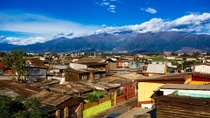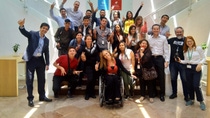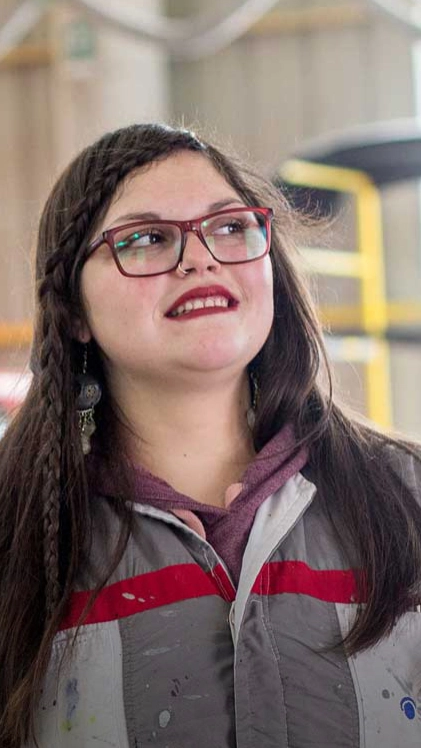Changing young lives
Espacio Inclusivo, a training program founded by BASF in Santiago de Chile, gives young people from low-income backgrounds the chance to learn valuable skills that can lead to great jobs.
At a workshop in the north of Santiago de Chile, a group of young people are filling in car panels with putty and sanding them down ready for painting. They are attending Espacio Inclusivo, a course in car refinishing. Now in their third week, they are finally getting a chance to put into practice some of the techniques they have learned.
Espacio Inclusivo is a three-month course run by BASF with its partners SKBergé, one of Chile’s biggest car dealers, 3M, and training institutions. When the students finish, they are offered internships. In the last four years, around 150 students have graduated from the course, and many of them are now working in the sector.

In Chile, nearly 16 percent of young people are not in education, employment or training. Espacio Inclusivo from BASF offers training to young people in car repainting – a highly skilled and well-paid job in a growing industry.
A fresh start
However, the course is about more than just gaining new skills. For Katherine Jara, a recent graduate, it was a lifeline. When her father died, it tore a hole in the middle of her close-knit family. She did not leave her house for weeks. Then, browsing the Internet, she came across an advert for the course. Among nursing and secretarial courses, it was the car-painting course that caught her eye. “I’ve always been interested in jobs that are considered to be for men. I guess it comes from helping out my dad in construction,” she says. Now Katherine has a job working for SKBergé.
The project is the brainchild of Fernando Farías, former business coordinator of BASF Chile’s car paint business, and his team. “We found that one of the main obstacles facing the workshops that buy BASF’s paints is a lack of trained workers,” says Farías.
The number of cars in Chile has almost doubled over the last decade. Dealers sold more than 400,000 new cars in 2018, an increase of 15 percent over the previous year. That has left auxiliary industries, such as car painting, struggling to keep up. Car painting has traditionally been an artisanal business, carried out in small family workshops, with skills passed down from generation to generation. Farías and his team saw a way to combine the company’s interests with those of its partners and to help young people from vulnerable backgrounds looking for opportunities.
I’ve always been interested in jobs that are considered to be for men."
Skills for life
Mario Urra, one of the BASF trainers, says the course can turn around students who come from difficult backgrounds. One former student was from one of Santiago’s toughest neighborhoods. With his father in jail and his mother on drugs, he could hardly see a way out of his predicament. But he was one of the most dedicated on the course, staying behind to pick up tips and help clean up. When he did not show up for three days, Urra went to find out what was wrong. The student had grown disillusioned, but Urra convinced him to return. Now, a couple of years later, the student has a job at a garage, a girlfriend, and a car of his own, and he recently moved into an apartment outside his old neighborhood. “This is more than a job. It is about quality of life,” says Urra.
Starting Ventures
Espacio Inclusivo is a BASF Starting Ventures project. The aim of this program is to develop sustainable business solutions that empower people with low incomes to achieve a better quality of life. At the same time, the program is expanding the market for BASF’s products and building strong business partnerships. Set up in 2016, there are now 12 projects worldwide in various industries.
Training with prospects
„We co-founded Espacio Inclusivo because we knew that many of the body shops to which we supply our refinishing coating, Glasurit®, were struggling to find qualified staff. So, we decided with our partners to help unemployed young adults train to become automotive dent removal and spray painters. With a secure income, these young people can now pay their own way.”
At Espacio Inclusivo, students learn step by step how to prepare the surface, mix the formulas and apply the paints. They leave here ready to work. We have developed a reputation for the quality of professional that we are producing. We’re changing the face of this activity – the workshops now come to us.”
The course provides students with the skills they need for the workplace. When they first come here, some arrive late, put their feet on the desk and play with their phones. We teach them what it is to have a job, to be responsible. I keep in touch with them after the course, check how they are doing and help if I can.”
Espacio Inclusivo 4.0
As an evolution of the Espacio Inclusivo program, BASF Chile developed an automotive painting course directed to people with hearing disabilities.
The course, taken by 11 young people, consisted of interactive theoretical and practical classes in order to achieve optimal training for the students. It included sign language interpreters, Trans Voice technology (real-time transcription system), accessible audiovisual information, with which hearing impaired students developed observation techniques for matching vehicle colors according to manufacturer codes and repairing damaged areas of cars, among others.

Once the course was completed, the students were able to put their new skills into practice: They painted and restored a car in BASF's customer facilities. Customers, such as Kaufmann, one of the leading companies in the automotive market, have been trained to onboard the new colleagues into their teams. For that purpose and to facilitate sustained inclusion they communicated through an application with instant sign language translation.












